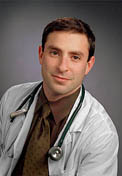| |
January 11, 2001
|
 |
PUBLIC HEALTH
Introducing Jonathan Freedhoff, M.D.
 ou're 30 years old, your career is finally going gangbusters, but your body is screaming for babies. No problem, just freeze your eggs for future use. You're worried that you and your partner will pass on your families' history of heart disease. No sweat, future gene therapy may erase that defect, and while you're at it, you might be able to choose the color of your child's hair, his or her intelligence level, and perhaps even what career your child is likely to choose. Why leave anything to fate? If you're also worried that you might not live long enough to see your grandchildren, rest assured that the scientists who doubled the lives of fruit flies might eventually extend yours too. If not, maybe a clone would help - that way you'll have some spare body parts. Our world is beginning to read like a copy of Brave New World or Utopia, yet all of these possibilities may soon be very real. ou're 30 years old, your career is finally going gangbusters, but your body is screaming for babies. No problem, just freeze your eggs for future use. You're worried that you and your partner will pass on your families' history of heart disease. No sweat, future gene therapy may erase that defect, and while you're at it, you might be able to choose the color of your child's hair, his or her intelligence level, and perhaps even what career your child is likely to choose. Why leave anything to fate? If you're also worried that you might not live long enough to see your grandchildren, rest assured that the scientists who doubled the lives of fruit flies might eventually extend yours too. If not, maybe a clone would help - that way you'll have some spare body parts. Our world is beginning to read like a copy of Brave New World or Utopia, yet all of these possibilities may soon be very real.

|
|
The Human Condition |
|
|
 |
By Jonathan Freedhoff, M.D. |
|
New medical and technological advances continually test humankind. The ethical issues that arise from
scientific advances beg the question: Are we trading our humanity in our frantic quest to unravel the mysteries of life? Making progress means that the practice of medicine is in constant flux to accommodate new therapies, new medicine, new techniques -- and this excites me as a physician. And since my daily work with patients is split primarily between the emergency room and the clinic, I am exposed to virtually every area of medicine. I hope to convey to you my sense of awe for the progress of science and how it affects all of us through this new public health column, "The Human Condition."
|

|
It is hard to believe how far we have come in such a short period of time. In our new global community, borders are more virtual than ever, and public health has never been more important.
|
 |
|
Each month thousands of new articles are published in medical journals revealing the latest discoveries. Scientists and doctors meet at conferences all over the world to discuss these discoveries and debate the changing role of medical practitioners and patients. To help you keep up with the changes that will affect your health, I will address the latest discoveries and ethical questions of the day, from euthanasia, biotechnology, and emerging diseases to nutraceuticals and the global AIDS pandemic -- anything that will affect how we as a species behave and survive.
It is hard to believe how far we have come in such a short period of time. In our new global community, borders are more virtual than ever, and public health -- the science and art of preventing disease, prolonging life, and promoting health and efficiency through organized community effort -- has never been more important. Together we'll explore the medical issues facing our communities, our planet, and ourselves.
Send feedback on this article.
Jonathan Freedhoff, M.D., is the Chief Resident in Family Medicine at the University of Ottawa Civic Hospital Campus and is completing a fellowship in emergency medicine. He's currently involved in a four-month volunteer project on Baffin Island, in the High Arctic region, where he's one of four family doctors working with the native population.
|

